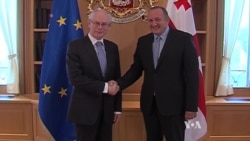LONDON —
The President of the European Council Herman van Rompuy visited Georgia Wednesday - the latest stop on a tour of former Soviet states which aim to sign Association Agreements with the European Union. Analysts say the agreements are likely to cause further friction between Moscow and the West.
Herman van Rompuy met Georgia’s President Giorgi Margvelashvili Wednesday in Tbilisi - and pledged that the EU would sign an Association Agreement by the end of June, a first step on the road to EU membership.
“Georgia at this time is not so much under threat, but it can be the case as so we are here to support them to show that they are not alone, that the EU, the 28 Members States are with them and that we have a common future,” said van Rompuy.
In 2008 Russia and Georgia fought a war over the breakaway regions of Abkhazia and South Ossetia - which Moscow later recognized as independent.
Europe and the West fear Moscow is plotting a similar scenario in eastern Ukraine, where separatists held a referendum Sunday on independence. The result was overwhelmingly in favor of breaking away from Kyiv. Critics called the polls illegitimate.
Prior to his Tbilisi visit, van Rompuy was given a guard-of-honor welcome in Moldova Tuesday. The former Soviet-controlled state is due to sign an Association Agreement with the European Union on June 27.
It’s a sign the West is not stepping back, said Nicholas Redman of the International Institute for Strategic Studies.
“The signing of those Association Agreements is the signal that the Europeans are taking this seriously, that they are not shrinking back, that they are prepared to contest with Russia for influence and primacy across the former Soviet space,” he said.
Moldova’s alliance with the EU is complicated by the pro-Russian breakaway region of Transdniestra, sandwiched between Moldova and Ukraine.
The region declared independence in 1990 - but has not been recognized by any other state. Over a thousand Russian troops are deployed on the territory.
Speaking in April, Russian President Vladimir Putin said Transdniestrans should not be forced to follow Moldova’s lead.
Putin said there is a large number of Russian citizens living in Transdniestria. People have their own understanding how they should build their future, their fate, he said. And that is nothing else but a manifestation of democracy if we allow to those people to do what they want.
The recent violence between pro-Russian and pro-Kyiv supporters in Ukraine’s Black Sea port of Odessa has focused attention on Russia’s links to Transdniestra, says Orysia Lutsevych of policy institute Chatham House.
“Because of the level of corruption we’ve seen in Ukraine, it [Odessa] was one of the hubs also for smuggling and trade for the territories including Transdniestra," said Lutsevych. "And we see some of the roots connecting through the southern corridor, from Transdniestra through Odessa to Russia.”
Through signing the Association Agreements next month with Georgia, Moldova and possibly Ukraine, Europe hopes to seal the former Soviet states within its orbit of influence. Analysts say Russia is unlikely to allow a smooth transition.
Herman van Rompuy met Georgia’s President Giorgi Margvelashvili Wednesday in Tbilisi - and pledged that the EU would sign an Association Agreement by the end of June, a first step on the road to EU membership.
“Georgia at this time is not so much under threat, but it can be the case as so we are here to support them to show that they are not alone, that the EU, the 28 Members States are with them and that we have a common future,” said van Rompuy.
In 2008 Russia and Georgia fought a war over the breakaway regions of Abkhazia and South Ossetia - which Moscow later recognized as independent.
Europe and the West fear Moscow is plotting a similar scenario in eastern Ukraine, where separatists held a referendum Sunday on independence. The result was overwhelmingly in favor of breaking away from Kyiv. Critics called the polls illegitimate.
Prior to his Tbilisi visit, van Rompuy was given a guard-of-honor welcome in Moldova Tuesday. The former Soviet-controlled state is due to sign an Association Agreement with the European Union on June 27.
It’s a sign the West is not stepping back, said Nicholas Redman of the International Institute for Strategic Studies.
“The signing of those Association Agreements is the signal that the Europeans are taking this seriously, that they are not shrinking back, that they are prepared to contest with Russia for influence and primacy across the former Soviet space,” he said.
Moldova’s alliance with the EU is complicated by the pro-Russian breakaway region of Transdniestra, sandwiched between Moldova and Ukraine.
The region declared independence in 1990 - but has not been recognized by any other state. Over a thousand Russian troops are deployed on the territory.
Speaking in April, Russian President Vladimir Putin said Transdniestrans should not be forced to follow Moldova’s lead.
Putin said there is a large number of Russian citizens living in Transdniestria. People have their own understanding how they should build their future, their fate, he said. And that is nothing else but a manifestation of democracy if we allow to those people to do what they want.
The recent violence between pro-Russian and pro-Kyiv supporters in Ukraine’s Black Sea port of Odessa has focused attention on Russia’s links to Transdniestra, says Orysia Lutsevych of policy institute Chatham House.
“Because of the level of corruption we’ve seen in Ukraine, it [Odessa] was one of the hubs also for smuggling and trade for the territories including Transdniestra," said Lutsevych. "And we see some of the roots connecting through the southern corridor, from Transdniestra through Odessa to Russia.”
Through signing the Association Agreements next month with Georgia, Moldova and possibly Ukraine, Europe hopes to seal the former Soviet states within its orbit of influence. Analysts say Russia is unlikely to allow a smooth transition.





